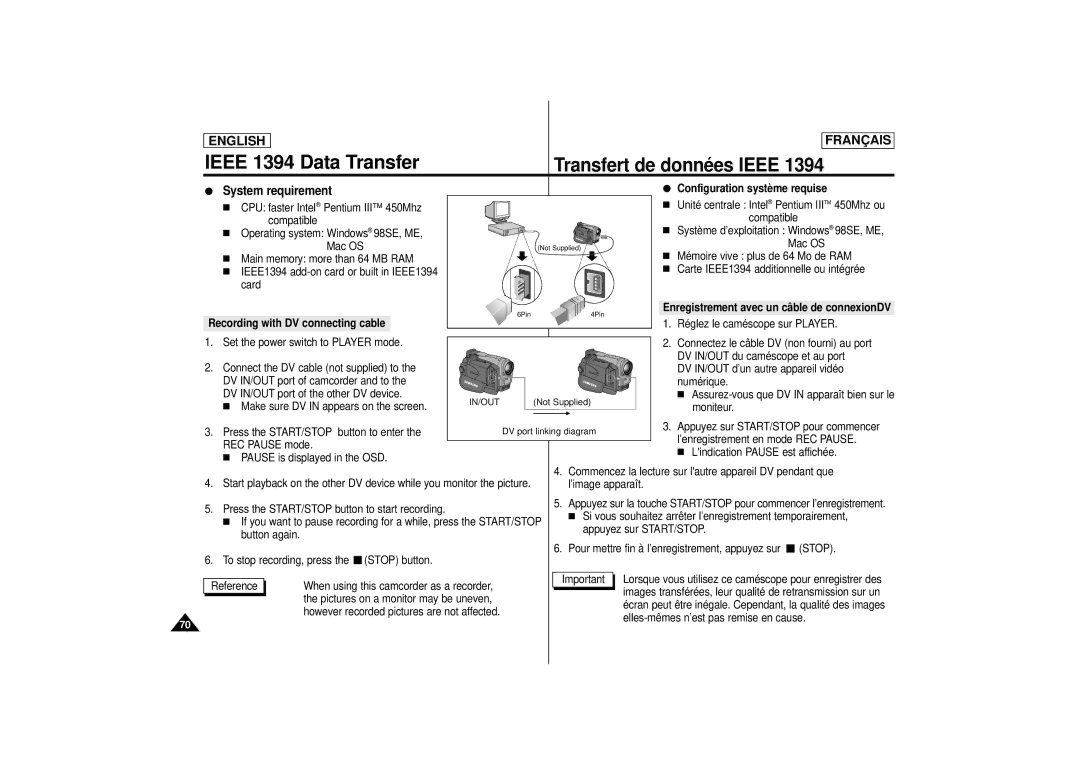
ENGLISH |
| FRANÇAIS |
IEEE 1394 Data Transfer | Transfert de données IEEE 1394 | |
● System requirement | ● Configuration système requise | |
■ CPU: faster Intel® Pentium III™ 450Mhz | ■ | Unité centrale : Intel® Pentium lIITM 450Mhz ou |
compatible |
| compatible |
■ Operating system: Windows® 98SE, ME, | ■ Système d’exploitation : Windows® 98SE, ME, | |
Mac OS | (Not Supplied) | Mac OS |
■ Main memory: more than 64 MB RAM | ■ Mémoire vive : plus de 64 Mo de RAM | |
■ IEEE1394 | ■ Carte IEEE1394 additionnelle ou intégrée | |
card |
|
|
|
| 6Pin | 4Pin | Enregistrement avec un câble de connexionDV | ||
Recording with DV connecting cable | 1. | Réglez le caméscope sur PLAYER. | ||||
|
| |||||
1. | Set the power switch to PLAYER mode. |
|
| 2. | Connectez le câble DV (non fourni) au port | |
2. | Connect the DV cable (not supplied) to the |
|
|
| DV IN/OUT du caméscope et au port | |
|
|
| DV IN/OUT d’un autre appareil vidéo | |||
| DV IN/OUT port of camcorder and to the |
|
|
| numérique. | |
| DV IN/OUT port of the other DV device. | IN/OUT | (Not Supplied) |
| ■ | |
| ■ Make sure DV IN appears on the screen. |
| moniteur. | |||
|
|
|
| |||
3. | Press the START/STOP button to enter the | DV port linking diagram | 3. Appuyez sur START/STOP pour commencer | |||
| l’enregistrement en mode REC PAUSE. | |||||
| REC PAUSE mode. |
|
|
| ||
|
|
|
| ■ L'indication PAUSE est affichée. | ||
| ■ PAUSE is displayed in the OSD. |
|
|
| ||
|
|
|
|
| ||
4. | Start playback on the other DV device while you monitor the picture. | 4. Commencez la lecture sur l'autre appareil DV pendant que | ||||
l’image apparaît. |
|
| ||||
5. Press the START/STOP button to start recording. | 5. | Appuyez sur la touche START/STOP pour commencer l’enregistrement. | |||
| ■ | Si vous souhaitez arrêter l’enregistrement temporairement, | |||
■ If you want to pause recording for a while, press the START/STOP |
| ||||
|
| appuyez sur START/STOP. | |||
button again. |
|
| |||
|
|
|
|
| |
| 6. | Pour mettre fin à l’enregistrement, appuyez sur |
| (STOP). | |
|
| ||||
6. To stop recording, press the ![]() (STOP) button.
(STOP) button.
|
|
| Important | Lorsque vous utilisez ce caméscope pour enregistrer des |
|
|
| ||
| Reference | When using this camcorder as a recorder, | ||
|
| the pictures on a monitor may be uneven, |
| images transférées, leur qualité de retransmission sur un |
|
|
| écran peut être inégale. Cependant, la qualité des images | |
|
| however recorded pictures are not affected. |
| |
|
|
| ||
70 |
|
|
| |
|
|
|
|
